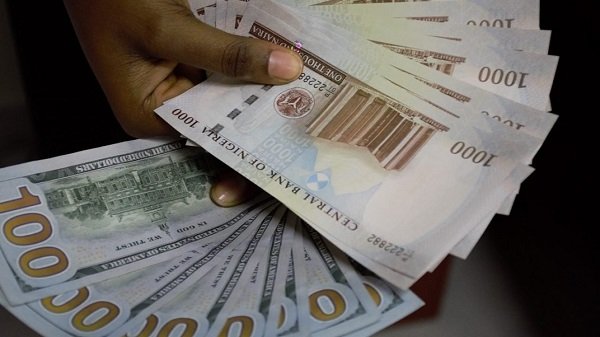
The naira has lost N17 to close at N522/$1 at the parallel market, a day after the Central Bank of Nigeria (CBN) stopped dollar allocation to 5,300 licensed Bureaux De Change (BDCs).
The local currency, which exchanges at N410.16/$1 at the official market, had closed Tuesday at N505/$1 on the parallel market.
A BDC trader in Ogba, Lagos, Hassan Ibrahim, said the rate depreciated from N505/$1 in the morning to N515/$1 in the at midday before closing at N522/$1 selling rate.
He said the BDCs buying rate closed at N515/$1 from N500/$1 traded on Tuesday.
Investigations showed that pressure on the naira intensified after manufacturers and foreign exchange end-users scrambled for scarce greenback to meet their business and personal needs.
Forex users preference for BDCs over banks have been linked to tedious documentation process and different levels of approvals required to purchase dollars from banks, which are usually not met at short notice.
Findings showed that request for dollar purchases at commercial banks’ branches are usually approved at the headquarters before 12 noon.
All requests not approved before the end of cutoff time will wait till the next business day.
Hence, many forex users in urgent need for dollars usually approach BDCs for quick purchases instead of waiting for the next business day.
CBN Governor, Godwin Emefiele had announced at the close of the Monetary Policy Committee (MPC) meeting in Abuja Tuesday, that $10,000 weekly allocation to BDCs would no longer be supplied to the operators.
He accused the BDCs of breaching regulatory guidelines, including engaging in money laundering and corruption.
The apex bank boss stopped further licensing of new BDCs with immediate effect. “We are concerned that BDCs have allowed themselves to be used for graft,” Emefiele said.
He said the CBN would channel weekly allocations of dollar sales to commercial banks for them to meet legitimate foreign exchange demands, while urging bank operators to sell forex to every customer who meets its requirements.
The BDCs are now expected to remain in business by sourcing dollars from autonomous sources, usually at higher rates.
Market dealers and analysts said the policy shift is bound to push prices of goods and services higher at a time inflation has reached a four-year high. The move is also expected to increase hoarding of scarce dollars in the hands of very few forex dealers.
In emailed report to investors, Managing Director, Financial Derivatives Company Limited, Bismarck Rewane, said channeling dollars solely to commercial banks will not solve the problem of market volatility.
For him, the banks also have challenges with complying with set foreign exchange trading guidelines.
“The question that arises is what is the optimal solution? Administrative controls or market pricing? The interim solution of substituting BDCs with banks is hardly going to achieve much. You are virtually handing over the yam barns to goats to secure. In the end, there will be no yams nor goats,” he said.
According to Rewane, one of the options is to simultaneously allow banks to retail dollars as they have done in the past and make BDCs engage in retailing same but at a buy rate different from today’s subsidized rate, that is, buy dollars from the CBN at the parallel market rate less a N10 premium.
“For example, if the parallel market rate is N500/$, the purchase rate from the CBN will be N490/$. If the BDCs sell at N550/$, the CBN increases its rate for BDCs to N540/$. That will be the same retail rate at the banks. This eliminates the arbitrage corridor and abuse. It will certainly reduce the demand for dollars and it must coincide with an increase in dollar supply from the CBN,” he said.
“This way, the naira will appreciate towards the ever elusive fair value or the Real Effective Exchange Rate (REER), which today is anywhere between N470 and N490/$,” he stated.
The BDCs are licensed by the CBN to sale foreign exchange to end users and comply with anti-money laundering regulations.
Also speaking, Head, Inter-Governmental Action Group against Money Laundering in West Africa (GIABA) Office, Nigeria, Timothy Melaye, said some of the BDCs were fined for non-rendition of returns and funding terrorism.
He said that dollar scarcity will escalate exchange rate adding that BDCs will face hard times while relying on other sources of dollar.
Melaye said dollar scarcity will lead to depreciation of the naira, higher production cost for manufacturers and uptick in inflation.
“When prices of commodities go up, that will have negative implication of inflation and reduced purchasing power for the people,” he said.
“For funding terrorism allegations against some BDCs, I think the CBN is taking precautions. The apex bank is looking at cost and risks of continued sale of dollars to BDCs and what that could lead to where non-compliant operators fund terrorism,” he said.
The records of the BDCs are expected to be made readily available to the CBN examiners as and when requested including carrying out customer due diligence, corporate governance and tax returns.
The operators ensure that forex gets to retail end of the market for travelers needing personal or business travel allowances, parents or guardians seeking dollars to pay for their children’s schools fees abroad or people that need dollars to pay medical bills abroad.
At the last count, the annual transaction turnover for the 5,300 CBN -licenced BDCs stood at N1 trillion.
Source: The NationNG






